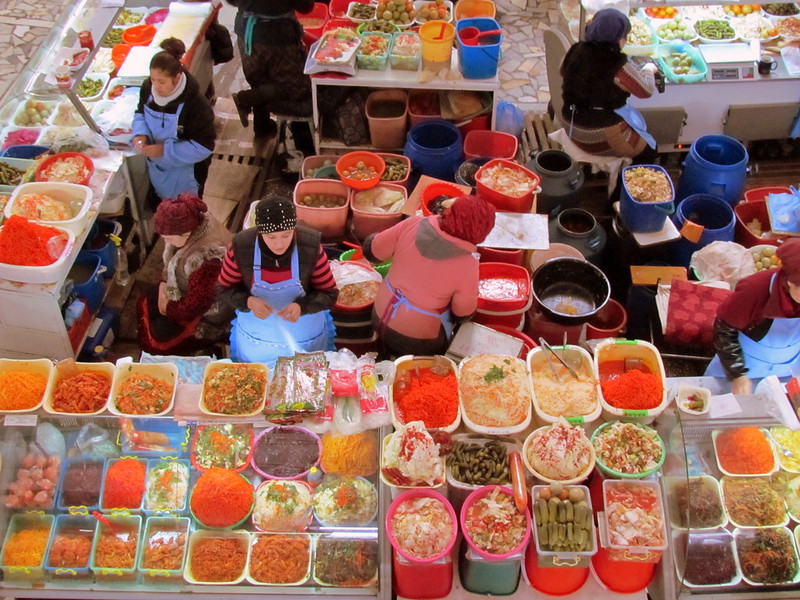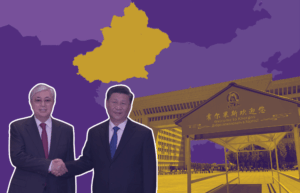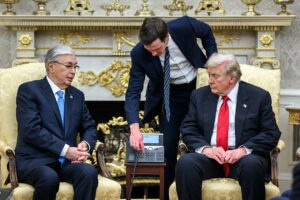Dr Jade McGlynn has published an article for The Diplomat discussing the modernisation of Britain’s Central Asian Trade Strategy, based on her report for the Henry Jackson Society, entitled ‘A Steppe Change: Should Britain Be Bolder In Central Asia?’. In it, she states the UK “needs to think more ambitiously and coherently about its business aims with Central Asia”. In developing relations with the Central Asian states, the UK could balance trade with human rights and developmental assistance. So far, the UK has failed to develop such a strategy, and efforts remain focused on trading opportunities. McGlynn wants the UK to take head of the political realities of these states and ensure it champions and actively encourages democracy and greater human rights while simultaneously organising and developing trade agreements. Novastan spoke to Dr McGlynn to find out more about her strategy. An example of where the UK has failed to do as much is their increasing arms deals with Turkmenistan, considered by human rights groups as one of the world’s most repressive and authoritarian regimes. In comparison, the UK’s assistance to Tajikistan and Kyrgyzstan has benefitted both nations and given the UK considerable soft power through showing commitment to the region beyond trade. The emerging signs of democratisation in Uzbekistan and Kazakhstan, Central Asia’s two largest economies and nations, show the region to be making a gradual change from what has long been considered an authoritarian area of the world. The landslide election of Sadyr Japarov in Kyrgyzstan should be cautiously championed for implementing democracy. By providing vocal support for Kyrgyzstan, the UK reminds the other nations that its trade, investment and support are connection to Kyrgyzstan’s continued democratic style of governance. This in turn could increase the likelihood for democratisation in the neighbouring states. The UK should take inspiration from the Obama administration’s C5+1 initiative and build on its positive reputation gained from development work in the region. This would then allow the UK to maintain channels with Turkmenistan and Tajikistan and shows they are open to trade should they ever move towards democratisation. The UK has not paid enough attention to Central Asia. When it has, only specific countries or aspects, for example trade with Kazakhstan, have been made the point of focus. A region-focused approach instead would benefit both Britain and countries where regional cooperation has not always been strong. Human rights must remain a priority As much as increased trade negotiations with these countries should be encouraged, she maintains that the UK cannot sign deals at the expense of human rights and jeopardization of a free and fair society. The UK’s current arms deals with Turkmenistan are a shocking example of sacrificing ethics in order to bolster trade. The lack of pressure on the UK to halter these deals is due to a lack of knowledge and media coverage of the area. Too often the mainstream, generalised media focuses on the bizarre rules put in place by President Gurbanguly Berdimuhamedov, shining the country in a comedic, ridiculous light. The reality of the brutal human rights abuses and widespread poverty despite the wealth of natural resources in the country is forgotten. Larger organisations rather than just specialised areas should give the country more attention in order to increase knowledge of Turkmenistan, something which would elevate pressure to stop these morally and ethically entirely unacceptable arms deals. These deals undermine the UK’s pronounced championship of human rights and should be stopped. Elsewhere, little has been done to improve the state of human rights for the citizens of Central Asia: despite claims by the governments of Kazakhstan and Uzbekistan as to the development of human rights, little evidence of this has yet been shown. Recent human rights abuses include censorship of journalists and oppression of the LGBTQ+ community. While democratic, the election of Sadyr Japarov in Kyrgyzstan and imprisonment of the most outspoken critic and presidential hopeful, Omurbek Tekebayev, puts the country as risk of returning to the populist authoritarianism overturned in 2010. It would be hypocritical of the UK to adopt a trade policy with such countries after public anti-authoritarian efforts in China and Russia and could demoralise activists in these countries who need the UK’s support. Implementing a human rights checklist backed up by independent NGOs from the region in order to assess milestones in terms of achieving greater democracy and freedom could encourage increased democratisation. This would enable the UK to measure economic engagement against human rights and democratisation milestones. Goals could be set for countries like Uzbekistan that claim to be installing more democratic milestones such as free access for election observers, the establishment of NGOs and funds to support independent media. Once reached, the country could continue to the next stage in economic relations. Putting a permanent representative in Bishkek, the capital of Kyrgyzstan, would symbolise the UK’s commitment to supporting the democratic potential of the region. Kyrgyzstan is currently the most democratic country and would demonstrate the UK’s hope that they should stay on this path. It would also reward and prioritise the most democratic country and encourage Sadyr Japarov, President of Kyrgyzstan, to continue this work. The UK alone would have enough power to rely on their influence to speed up democratisation in Central Asia. However, the European interest, particularly from countries who keep human rights as a core component of their foreign policy, namely Scandinavian countries, and desires in Washington for the Biden administration to continue with Obama’s policy, allow for a combined effort which ups the pressure for Central Asian nations. Background of Central Asia The collapse of the Soviet Union in 1991 and subsequent independence for Central Asian countries led to a long-term struggle for democracy. Many of these countries contain deeply embedded ethnic tensions dating back to Stalin’s policies, for example in the Osh region of Kyrgyzstan. These countries have had to deal with civil wars, widespread humans rights abuses and as a result their economies have struggled to achieve their full potential. Kyrgyzstan and Tajikistan still rely heavily on remittances. However, Kazakhstan, Turkmenistan and Uzbekistan have seen a near doubling in per capita income in purchasing power parity since independence and political conflicts have not deterred interest from abroad in trade and investment. These countries are rich in natural resources, which constitute 65 per cent of exports in Kyrgyzstan, Tajikistan and Uzbekistan, as well as over 90 per cent in Kazakhstan and Turkmenistan. The UK has now left the EU and thus has the freedom to pursue its own trade deal. Economic, security and geopolitical considerations make Central Asia a good trade partner, including the appetite for British goods in countries such as Kazakhstan and the pre-established trade and diplomatic presence of the UK in each of the nations. The Department of International Trade has put in effort to build on existing standing especially in Kazakhstan, where UK cultural, service and educational exports are popular. For example, 4,000 Kazakh students are currently studying in the UK and more visas are issues to Kazakh students than Australians. With two established UK trade offices in Kazakhstan, a comparatively large economy and a consistently open approach to free trade, McGlynn deems the country a promising contender for UK export growth. In comparison, Uzbekistan also has potential since the United Kingdom-Uzbekistan Partnership and Cooperation Agreement (PCA) signed in 2019 enabled the two to grant each other the most favoured nation (MFN) treatment. This is important because Uzbekistan does not belong in the World Trade Organisation. Kyrgyzstan and Tajikistan have less ample economic opportunities due to widespread poverty, a relatively low GDP of $8.09 and $7.52 billion respectively, although it is still important to include them. The UK accounts for almost half of all Kyrgyzstan’s export, mainly gold, which provides leverage to promote democratisation. Trade between the UK and Turkmenistan has flourished under the auspices of the Turkmen-British Trade and Economic Council, even if it allows for a growth in controversial arms deals. The UK is not alone in the rush to take advantage of such lucrative deals: Italy has established a business forum with Central Asian countries, signing arms deals with Turkmenistan. The USA has just launched the Central Asia Investment Partnership and the Scandinavian nations have recently held the Kazakhstan Northern European Investment Forum. McGlynn advises the UK to hurry in these countries’ footsteps but paying heed not to lose sight of their moral and democratic values. Impact on other countries
Economic investment can also improve security interests, namely in helping to stabilise the countries. With a combined population of 75million, the average age of a Central Asian citizen is 27.6, highlighting the need for economic opportunities for young people. Without such opportunities, the likelihood for young people to become radicalised or turn to extremist groups is far greater. The UK’s trade influence can be used as a positive counter example to major geopolitical players in that region- Russia and China. The UK has condemned China’s campaign against the Uyghur people in Xinjiang, a campaign which has also targeted ethnic Kazakhs and Kyrgyz, the Kazakhs being the second largest Turkic-speaking indigenous community in the region after the Uyghurs. It also contains many ethnic Kyrgyz. The UK’s economic approach must take into account these people, support them and help refugees.
Lily Shanagher Edited by Tommy Hodgson
 How can Britain develop trade in Central Asia?
How can Britain develop trade in Central Asia? 



